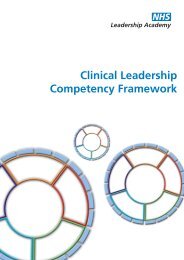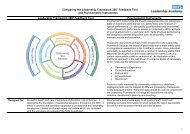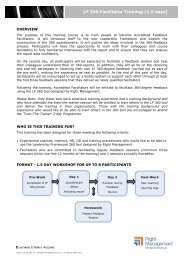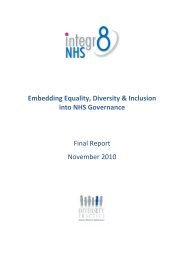Healthy NHS Board: a review of - NHS Leadership Academy
Healthy NHS Board: a review of - NHS Leadership Academy
Healthy NHS Board: a review of - NHS Leadership Academy
You also want an ePaper? Increase the reach of your titles
YUMPU automatically turns print PDFs into web optimized ePapers that Google loves.
3.2 Ensuring Accountability<br />
Many <strong>of</strong> the processes <strong>of</strong> ensuring accountability<br />
are unchanged since our original <strong>review</strong>. However,<br />
there is now a stronger prioritisation <strong>of</strong> sharing<br />
poor results, and there is greater guidance on<br />
approaches that might facilitate accountability.<br />
Deficiencies in information sharing were seen as<br />
central to the serious failures at Mid Staffordshire <strong>NHS</strong><br />
Foundation Trust (Francis, 2013). Greater transparency<br />
with stakeholders (including the media (Committee<br />
on Standards in Public Life, 2013)) is recommended in<br />
healthcare and non-healthcare domains (Institute <strong>of</strong><br />
Chartered Secretaries and Administrators, 2011, Francis,<br />
2013).<br />
Stakeholder engagement is now more strongly<br />
emphasised. We describe this in detail in later sections<br />
<strong>of</strong> this <strong>review</strong> (see Section 4.3), but it has particular<br />
relevance to formulating strategy: guidance now<br />
recommends that all stakeholder groups (staff, patients,<br />
community) are involved in identifying strategic choices<br />
and agreeing a way forward (Francis, 2013). In the case<br />
<strong>of</strong> <strong>NHS</strong> Foundation Trusts, the Council <strong>of</strong> Governors<br />
will have a strengthened role (Monitor, 2012a). In<br />
terms <strong>of</strong> organisational direction, governors must<br />
approve whether private care activity interferes with the<br />
organisation supporting <strong>NHS</strong> work and other functions,<br />
and any increases in non-<strong>NHS</strong> income <strong>of</strong> 5% or more;<br />
in future, governors will have to approve any significant<br />
transactions, any application for a major organisational<br />
change (such as a merger, acquisition or dissolution),<br />
and any amendment to the organisation’s constitution<br />
(Monitor, 2012b). However, recent research on Foundation<br />
Trusts indicates that governors are not as yet supported<br />
to engage in strategic discussions <strong>of</strong> this kind, and<br />
recommend that boards should seek to better empower,<br />
inform and engage governors (Ocloo et al., 2013, Wright<br />
et al., 2011, Allen et al., 2012b, Allen et al., 2012a) (this is<br />
discussed further under ‘Ensuring accountability’ (Section<br />
3.2) and ‘Engagement’ (Section 3.4)).<br />
Our previous <strong>review</strong> noted the importance <strong>of</strong> workforce<br />
development strategy. This remains an important issue,<br />
but is now presented in a separate section (see ‘People<br />
strategy’ - Section 7.6).<br />
Accountability is cast in recent guidance on standards<br />
in public life as an ongoing dialogue between the<br />
organisation and its stakeholders: it is therefore<br />
a means by which the board achieves openness<br />
and trust with internal and external stakeholders.<br />
This in turn may create a ‘virtuous feedback loop’:<br />
stakeholders understand the organisational vision and<br />
objectives, how well they are being achieved, and how<br />
stakeholders have contributed to these; developing such<br />
understanding and trust may increase the likelihood<br />
<strong>of</strong> further stakeholder engagement (Committee on<br />
Standards in Public Life, 2013).<br />
Information should be presented in a way that is fair,<br />
balanced and understandable (Financial Reporting<br />
Council, 2012, Committee on Standards in Public Life,<br />
2013): it should be ‘intelligent and adaptable, not just<br />
data’ (Committee on Standards in Public Life, 2013).<br />
Honest, candid communication with the public is seen<br />
as increasingly important (Francis, 2013, Institute <strong>of</strong><br />
Chartered Secretaries and Administrators, 2011). An<br />
appropriate balance between reporting achievement<br />
and non-compliance should be provided, with matters<br />
that need to be improved given priority over those<br />
where the organisation is already compliant (Francis,<br />
2013).<br />
In addition to clarity about performance, boards should<br />
communicate clearly the purpose <strong>of</strong> various aspects <strong>of</strong><br />
the organisation (Financial Reporting Council, 2012,<br />
Institute <strong>of</strong> Chartered Secretaries and Administrators,<br />
2011). Examples <strong>of</strong> this include the roles <strong>of</strong> board<br />
members (Committee on Standards in Public Life,<br />
2013), any conflicts <strong>of</strong> interest (Dr Foster Intelligence,<br />
2011, Monitor, 2010a, Pr<strong>of</strong>essional Standards Authority,<br />
16 The <strong>Healthy</strong> <strong>NHS</strong> <strong>Board</strong>, 2013: Principles for Good Governance











